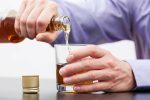Studies have found that the isoflavones in kudzu can help lower cholesterol levels and reduce blood pressure. When alcohol is consumed, kudzu may reduce the time it takes for it to travel to the brain. A slightly increased concentration of alcohol in the brain results in a quicker reward, which in turn reduces a person’s desire to drink more alcohol. The use of kudzu for alcoholism originated in China around 600 A.D. The Chinese noticed that people who consumed the plant started to drink less.

In addition, the diaries permitted the participants to enter additional data that could not be recorded on the watch. The kudzu plant is a vine that resembles poison ivy and is native to several Asian countries. The easiest way to lookup drug information, identify pills, check interactions and set up your own personal medication records. Role of Funding Source Funding for this study was provided by NIAAA grant R01-AA10536 to Dr. Lukas and NCCAM grant P01-AT to Dr. Lee.
More about kudzu
In addition, participants reported pill taking by checking time-of-day boxes on daily diaries and by entries on the wrist actigraphy watches. A standardized formulation of kudzu extract produced minimal side effects, was well-tolerated and resulted in a modest reduction in alcohol consumption in young non treatment-seeking heavy drinkers. In some instances, even kudzu extract for alcoholism a single dose of kudzu extract reduced alcohol consumption and prevented binge drinking (4, 5). This study provides additional evidence that an extract of the kudzu root significantly reduces alcohol consumption by human participants and confirms that this botanical medication may be a safe and effective adjunct pharmacotherapy for treating alcohol use disorders.
Any product carrying a THR mark can be relied upon to contain the amounts of herb/active ingredient as stated on the bottle. Kudzu, whose scientific name is Pueraria mirfica, is a vine used in Chinese medicine for a variety of health promoting purposes. The information we provide while responding to comments is not intended to provide and does not constitute medical, legal, or other professional advice. The responses to comments on fitrecovery.com are designed to support, not replace, medical or psychiatric treatment. Please seek professional care if you believe you may have a condition. If you have any questions about using kudzu recovery for alcoholism, please leave them in the comment box below.
Kudzu: the supplement said to curb drinking by reducing cravings for alcohol
Separate general linear model ANOVAs for data with repeated measurements were used to analyze the number of drinks per week and the number of heavy drinking days per week. The two treatments (kudzu and placebo) were analyzed as fixed effects and time (weeks since randomization) as a repeated-measurements effect. In all analyses, the baseline drinking level was modeled as a covariate of the respective dependent variable (e.g., the number of drinks per day in the baseline phase was modeled as a covariate when the dependent variable was the number https://ecosoberhouse.com/ of drinks during the treatment phase). Effect size is reported using the variance-accounted for statistic Partial Eta-Squared (η2Partial). All tests were two-sided with significance level of 0.05 and were performed using SPSS software (version 19.0, IBM SPSS, Inc, Chicago, IL). Although the number of sips taken per beer did not significantly increase in this study – contrary to what was found in our previous study (Lukas et al., 2005) – we did observe an increase in the time taken to consume a beer which is consistent with our previous study.
- It is, therefore, thought not to make alcohol more dangerous – merely slow down our rate of drinking.
- This product may adversely interact with certain health and medical conditions, other prescription and over-the-counter drugs, foods, or other dietary supplements.
- Our laboratory has been involved in assessing an extract of the kudzu root (Pueraria lobata) for its ability to reduce alcohol consumption in humans.
A total of 227 breath samples were possible from all subject visits during the trial and compliance was equally distributed between the two groups; the kudzu extract group provided 131 of a possible 136 samples and the placebo group provided 84 of a possible 91 samples. Only one breath sample was positive for alcohol during all three phases of the study. One small study looked at the effects of kudzu in 17 men ages 21–33 who reported drinking approximately 22–35 drinks per week. The researchers gave participants either kudzu extract or a placebo every day for 4 weeks (2). A standardized formulation of kudzu extract produced minimal side effects, was well-tolerated, and resulted in a modest reduction in alcohol consumption in young nontreatment-seeking heavy drinkers. Additional studies using treatment-seeking alcohol-dependent persons will be necessary to determine the usefulness of this herbal preparation in reducing alcohol use in other populations.
For Patients & Caregivers
Each participant was treated with kudzu and the placebo, and no side effects were found with either treatment. Three-day samples of wrist actigraphy data from one subject during baseline (top) and after 10 d of kudzu extract treatment (bottom); arrows depict alcoholic drinks. Also a researcher made a small clinical study of 14 men and women who were heavy drinkers. The investigator speculated that Kudzu increases blood alcohol concentration. Kudzu is a botanical used in traditional medicine to treat alcoholism, cardiovascular disease, menopausal symptoms, diabetes, fever, the common cold, and neck or eye pain.
Got a drinking problem? Try kudzu – NBC News
Got a drinking problem? Try kudzu.
Posted: Tue, 17 May 2005 07:00:00 GMT [source]
